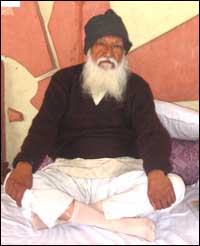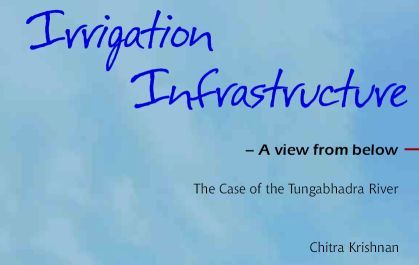Political
First hand report on the Bihar flood zone 2008
Posted on 24 Jan, 2009 09:23 AMPriya Ranjan, recently visited the flood hit areas in Bihar recently and found that things were really sad and pathetic. Mushhar communities were surviving on snails and grass-seeds.
Should IMD give away meteorological data for free ?
Posted on 22 Jan, 2009 04:21 AMIndia Water Portal has a meteorological data tool (https://www.indiawaterportal.org/data/metdata) that gives rainfall data (and 10 other meteorological parameters) for each district of India for 100 years from 1901 to 2002. Over the past couple of years, many many people have expressed that they found this data useful and requested us to enhance it. The data on our meteorological data tool is from a research dataset put out by the Tyndall Center for Climate Change Research in the University of East Anglia, UK. The reason we got the data from them, is that IMD, India Meteorological Department, which is the chief source of official meteorological data in India, sells this data. To get the kind of all India data above, would be prohibitively expensive. Further, they would not allow this data to be made publicly available, as they sell the same.
Protesting broken promises: Dr. G.D. Agrawal resumes fast-unto-death
Posted on 20 Jan, 2009 12:19 PM
Images of a dying river, handwritten Press releases & more: Images of a Struggle on Flickr Charging the Government of India with not keeping its solemn commitment to keep the River Bhagirathi alive in its pristine stretch from Gangotri to Uttarkashi, Dr. G.D. Agrawal has resumed his fast-unto-death from Makar Sankranti Day, Wednesday, Jan 14, 2009.
You may recall that Prof. G. D Agrawal, former Professor & Dean of Students at IIT-Kanpur, the first Member-Secretary of India's Central PollutionControl Board and one of India's foremost environmental scientists went on a fast from June 13, 2008 to seek uninterrupted flow of River Bhagirathi (Ganga) in its natural form between Gangotri and Uttarkashi. His demand was very limited & specific, i.e., that the River Ganga be allowed to flow in its natural form in this 125 km stretch from its origin. This is the only stretch left now where the Ganga can still be seen in its pristine form. Dr. Agrawal requested the Govt. of India & the State Govt. of Uttarakhand to stop construction of Hydro Electric Projects (HEPs) in this stretch so that river flow was not diverted through tunnels that would destroy its ecology and its unique self-purifying properties. (diagrams are provided in the attached press release). Indians across the world got sensitized and lent their support to Prof Agrawal. Many wrote or met the PM of India and the CM of Uttarakhand and requested them to protect the Holy Ganga , whom Pandit Jawaharlal Nehru described as India's civilizational identity.
GOONJ's urgent appeal to provide for winters in the the flood affected districts of Bihar
Posted on 17 Jan, 2009 02:08 PMThis year we certainly need much larger quantities due to extensive work going on in flood affected areas of Bihar & Orissa. We are thankful to a large number of organizations & individuals who whole-heartedly supported our campaign Rahat Floods.
Water themed 2009 Calendars - Vigyan Vijay Foundation
Posted on 13 Jan, 2009 10:46 PMThe calendar features images from the VigyanVijay's Eco-water literacy project titled "Youth for Water". VigyanVijay's Eco-water literacy project titled "Youth for Water", in the progress of awareness to youth of different age groups, has evolved a network of institutions with water elements in the NCR- Delhi region. Among these sites, 12 of them have been selected for conducting Eco-water Trails (walks). At each of these selected sites, various key elements were identified for conducting "Water Trials"to the lead volunteers and teachers with keen interest for taking the messages to youth and the communities they are associated with.
Press Release by SANDRP: Why does our Govt have no value for rivers ?
Posted on 08 Jan, 2009 10:32 AMA two day National Workshop on need for policy and legal norms for allowing freshwater flows in Rivers in India on January 3-4, 2009 at Bangalore ended with a unanimous demand that governments must allow continuous, sustained freshwater flows in all perennial rivers of India, whenever, a dam, diversion or hydropower project is planned, constructed or operated. Inaugurating the workshop on the morning of January 3, 2009, Shri L C Jain, former member, planning commission of India (and many other important posts), expressed his pain and anguish on the state of India's Rivers, "It is very disturbing that the acts of commissions and omissions of the authorities have ruthlessly, blindly, heartlessly lead todestruction of almost every major rivers of India. The hearts of the officials and ministers should throb for the millions depending for their needs and livelihoods on the rivers, but it seems that the stones of the South and North block buildings have entered their hearts." Quoting Gandhiji's agenda for the economic independence of India from what he wrote in the Young India on November 29, 1929, Jain said, Land, Water and Air cannot be subject of commerce, but the planners lock up the pain, hunger, malnutrition in the paragraphs of their five year plan documents and do not ensure their inclusion in their actual plans and programmes. He expressed his deep anguish that even the recommendations of the official policies and committees on ensuring freshwater flows in the rivers remain unimplemented.
Preliminary consolidated report on the effect of climate change on water resources, prepared by the Central Water Commission and the National Institute of Hydrology, under the guidance of the Ministry of Water Resources in 2008
Posted on 05 Jan, 2009 11:22 AMThe Preliminary Consolidated Report on the Effect of Climate Change on Water Resources, prepared by the Central Water Commission and the National Institute of Hydrology, under the guidance of the Ministry of Water Resources in 2008, is one of the first official reports made available by the Government of India, of a reliable quantitative assessment based on field data, of the likely effect of climate change on the availability of water resources, i.e. on the glaciers and snow melt, on rainfall and their effect on run off into the river system and their contribution to ground water. In the Report, an attempt has been made to give a brief account of the available studies on possible impacts of climate change on India's water resources, change in India's water needs, climate of India, river basins of the country, present water resources and future demand and supply, impacts of projected climate change and variability, and associated hydrological events and likely vulnerability of regional water resources to climate change. Identification of key risks, research needs and prioritisation of mitigation strategies has also been discussed. Access the report here: Preliminary Consolidated Report on the Effect of Climate Change on Water Resources
DEWATS Newsletter: Volume 1|Issue 5|December 2008
Posted on 27 Dec, 2008 10:13 AM  The DEWATS Newsletter, published bi-monthly by BORDA in Bremen, constitutes a compilation of links to articles about dewats and sanitation from the BNS N
The DEWATS Newsletter, published bi-monthly by BORDA in Bremen, constitutes a compilation of links to articles about dewats and sanitation from the BNS N
"Irrigation infrastructure - A view from below"
Posted on 27 Dec, 2008 03:52 AM "Irrigation Infrastructure - A View from below" is a new research study by Chitra Krishnan funded by the "Knowledge in Civil Society" initiative.
"Irrigation Infrastructure - A View from below" is a new research study by Chitra Krishnan funded by the "Knowledge in Civil Society" initiative.

